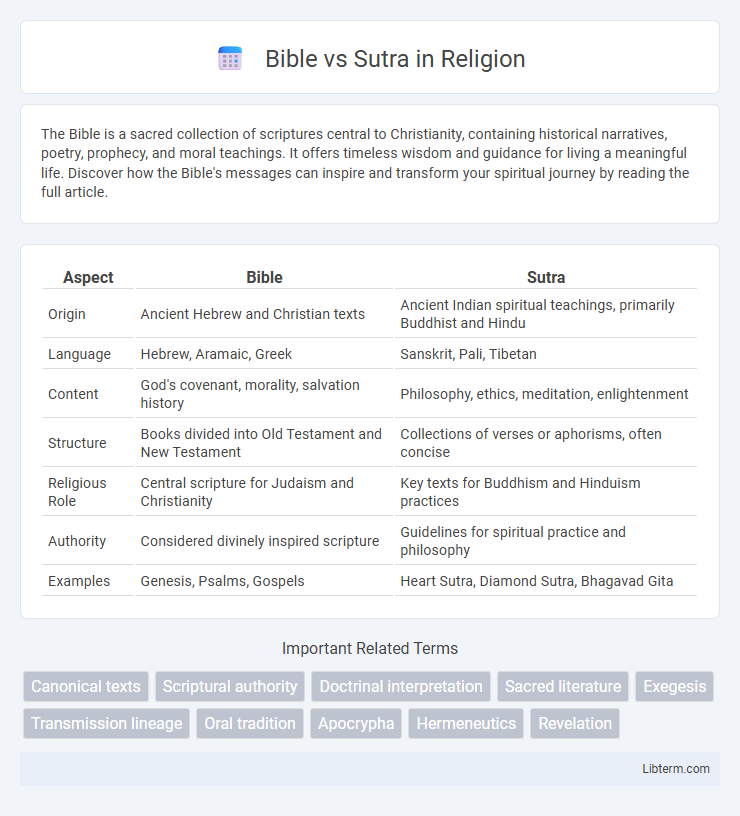The Bible is a sacred collection of scriptures central to Christianity, containing historical narratives, poetry, prophecy, and moral teachings. It offers timeless wisdom and guidance for living a meaningful life. Discover how the Bible's messages can inspire and transform your spiritual journey by reading the full article.
Table of Comparison
| Aspect | Bible | Sutra |
|---|---|---|
| Origin | Ancient Hebrew and Christian texts | Ancient Indian spiritual teachings, primarily Buddhist and Hindu |
| Language | Hebrew, Aramaic, Greek | Sanskrit, Pali, Tibetan |
| Content | God's covenant, morality, salvation history | Philosophy, ethics, meditation, enlightenment |
| Structure | Books divided into Old Testament and New Testament | Collections of verses or aphorisms, often concise |
| Religious Role | Central scripture for Judaism and Christianity | Key texts for Buddhism and Hinduism practices |
| Authority | Considered divinely inspired scripture | Guidelines for spiritual practice and philosophy |
| Examples | Genesis, Psalms, Gospels | Heart Sutra, Diamond Sutra, Bhagavad Gita |
Introduction: Understanding Sacred Texts
The Bible and Sutras serve as foundational sacred texts in Christianity and Buddhism, respectively, each encompassing distinct religious teachings, historical contexts, and literary genres. The Bible consists of the Old and New Testaments, offering narratives, laws, prophecies, and moral guidance central to Judeo-Christian faiths, while Sutras, such as the Pali Canon and Mahayana texts, present discourses attributed to the Buddha and his disciples focused on enlightenment and ethical living. Understanding these texts involves recognizing their roles not only as spiritual guides but also as cultural and philosophical frameworks shaping diverse religious traditions.
Historical Origins of the Bible and Sutras
The Bible, originating around the 1st millennium BCE, is a collection of sacred texts central to Judaism and Christianity, composed in Hebrew, Aramaic, and Greek, reflecting diverse historical contexts from ancient Israel to early Christian communities. Sutras, forming the foundational scriptures of Buddhism and Jainism, originated around the 5th to 3rd centuries BCE in ancient India, written in languages such as Sanskrit and Pali, capturing spiritual teachings and philosophical dialogues. Both texts serve as religious and cultural cornerstones, deeply influencing their respective civilizations and theological traditions through centuries of transmission and interpretation.
Formation and Compilation Processes
The Bible's formation involved centuries of oral traditions and written texts, compiled by various religious councils and scholars between the 1st millennium BCE and the 4th century CE, resulting in the Old and New Testaments. In contrast, Sutras, particularly within Buddhist and Hindu traditions, were transmitted orally before being transcribed, with significant compilation occurring between the 5th century BCE and 5th century CE, reflecting teachings attributed to key religious figures like the Buddha. Both texts exhibit layered editorial processes and canonical deliberations that shaped their authoritative status within their respective religious communities.
Core Teachings and Philosophies
The Bible emphasizes the themes of salvation, faith in God, and moral commandments as foundations for a righteous life, highlighting the relationship between God and humanity through Jesus Christ. Sutras, such as those in Buddhism and Hinduism, focus on enlightenment, the cessation of suffering, and the practice of meditation and ethical conduct to achieve spiritual liberation (nirvana or moksha). Both texts provide ethical guidelines and spiritual insights but diverge in their views of divinity, the self, and ultimate purpose, with the Bible centering on a monotheistic God and Sutras emphasizing experiential wisdom and inner transformation.
Language and Literary Styles
The Bible, primarily written in Hebrew, Aramaic, and Greek, encompasses diverse literary styles including narrative, poetry, prophecy, and epistles, emphasizing historical context and spiritual teachings. Sutras, traditionally composed in Sanskrit, Pali, or regional languages, utilize concise, aphoristic, and didactic prose or verse to convey philosophical doctrines and meditative practices. The Bible employs rich metaphor and allegory to communicate theological themes, while Sutras often favor succinctness and mnemonic phrasing to facilitate oral transmission and contemplation.
Approaches to Morality and Ethics
The Bible frames morality and ethics through divine commandments and the teachings of Jesus, emphasizing faith, repentance, and love as central principles. Sutras, particularly Buddhist ones, guide ethical behavior via the Eightfold Path, focusing on mindfulness, compassion, and detachment from desires to achieve enlightenment. Both texts shape moral frameworks rooted in spiritual goals but differ in their theological foundations and methods of ethical cultivation.
Key Figures and Narratives
The Bible centers on key figures such as Moses, David, Jesus Christ, and Paul, whose narratives shape Judeo-Christian theology and history through stories like the Exodus, the life of Jesus, and the apostolic missions. In contrast, the Sutras, primarily Buddhist texts, highlight figures like Siddhartha Gautama (the Buddha), along with disciples such as Ananda and Mahakasyapa, focusing on teachings about enlightenment, the Four Noble Truths, and the Eightfold Path. These foundational narratives reflect distinct spiritual goals--salvation and covenant for the Bible, and liberation from suffering through wisdom and meditation in the Sutras.
Rituals and Religious Practices
The Bible outlines rituals such as baptism, communion, and Sabbath observance, emphasizing faith and covenant with God in Christianity and Judaism. Sutras, particularly in Buddhism and Hinduism, detail rituals like meditation, chanting, and puja, focusing on spiritual enlightenment and karma. Both texts guide adherents in structured religious practices but differ in their theological foundations and ritual expressions.
Influence on Culture and Society
The Bible has profoundly shaped Western culture, influencing legal systems, art, literature, and moral values across centuries. The Sutras, particularly in Buddhism and Hinduism, have deeply impacted Eastern philosophies, meditation practices, and social ethics throughout Asia. Both texts serve as foundational pillars that guide cultural identity, rituals, and societal norms within their respective regions.
Modern Interpretations and Relevance
Modern interpretations of the Bible emphasize its historical context and moral teachings, often integrating contemporary ethical issues to maintain relevance in diverse societies. Sutras, particularly Buddhist texts, are interpreted through lenses of mindfulness and psychological well-being, resonating with modern spiritual practices and secular meditation movements. Both scriptures influence contemporary culture by offering frameworks for ethical behavior and personal growth adaptable to current global challenges.
Bible Infographic

 libterm.com
libterm.com